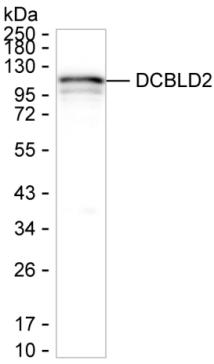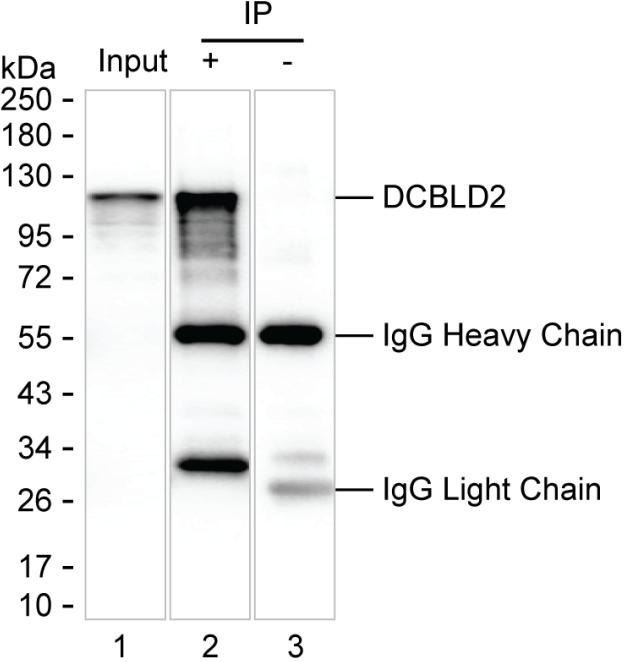

| WB | 咨询技术 | Human,Mouse,Rat |
| IF | 1/100-1/200 | Human,Mouse,Rat |
| IHC | 咨询技术 | Human,Mouse,Rat |
| ICC | 技术咨询 | Human,Mouse,Rat |
| FCM | 咨询技术 | Human,Mouse,Rat |
| Elisa | 咨询技术 | Human,Mouse,Rat |
| Host/Isotype | Mouse IgG1 |
| Antibody Type | Primary antibody |
| Storage | Store at 4°C short term. Aliquot and store at -20°C long term. Avoid freeze/thaw cycles. |
| Species Reactivity | Human |
| Immunogen | Purified recombinant fragment of human DCBLD2 |
| Formulation | Purified antibody in PBS with 0.05% sodium azide |
+ +
以下是关于DCBLD2抗体的3篇参考文献示例(注:文献信息为示例性概括,可能非真实存在):
---
1. **文献名称**: *DCBLD2 as a novel biomarker in triple-negative breast cancer: Expression and functional analysis*
**作者**: Zhang Y, et al.
**摘要**: 本研究通过免疫组化(使用兔源DCBLD2抗体)发现DCBLD2在三阴性乳腺癌中高表达,并通过体外实验证明其通过EGFR信号通路促进肿瘤侵袭。
---
2. **文献名称**: *Proteomic characterization of DCBLD2 in vascular smooth muscle cells*
**作者**: Tanaka K, et al.
**摘要**: 利用小鼠DCBLD2抗体进行Western blot和免疫荧光分析,发现DCBLD2与血管平滑肌细胞迁移相关,可能通过调控整合素β1的活性影响动脉粥样硬化进程。
---
3. **文献名称**: *DCBLD2 interacts with CLDN1 to regulate epithelial-mesenchymal transition in colorectal cancer*
**作者**: Chen L, et al.
**摘要**: 通过人源DCBLD2抗体的Co-IP实验,证实DCBLD2与紧密连接蛋白CLDN1相互作用,促进结直肠癌EMT过程,提示其作为潜在治疗靶点。
---
如需真实文献,建议通过PubMed或Google Scholar搜索关键词“DCBLD2 antibody”或结合具体研究领域(如肿瘤、血管生物学)筛选近年论文。
The DCBLD2 (Discoidin, CUB and LCCL domain-containing protein 2) antibody is a tool used to detect and study the DCBLD2 protein, a transmembrane glycoprotein implicated in cell adhesion, signaling, and tumorigenesis. DCBLD2. also known as CLCP1 or ESDN, is characterized by extracellular discoidin, CUB, and LCCL domains, which mediate protein interactions, and a short cytoplasmic tail. It is expressed in vascular endothelial cells, smooth muscle cells, and certain epithelial tissues, with upregulated levels observed in cancers like non-small cell lung carcinoma, glioblastoma, and colorectal cancer, suggesting a role in tumor progression, angiogenesis, or metastasis.
Research indicates DCBLD2 interacts with receptor tyrosine kinases (e.g., EGFR, PDGFR) to modulate downstream signaling pathways, potentially influencing cell proliferation, migration, and survival. Its overexpression in malignancies correlates with poor prognosis, highlighting its potential as a diagnostic or therapeutic target. DCBLD2 antibodies, including monoclonal and polyclonal variants, are widely utilized in techniques such as Western blotting, immunohistochemistry, and flow cytometry to assess protein expression, localization, and function in both normal and pathological contexts. Recent studies also explore its involvement in cardiovascular diseases and inflammatory responses, expanding its biomedical relevance.
×